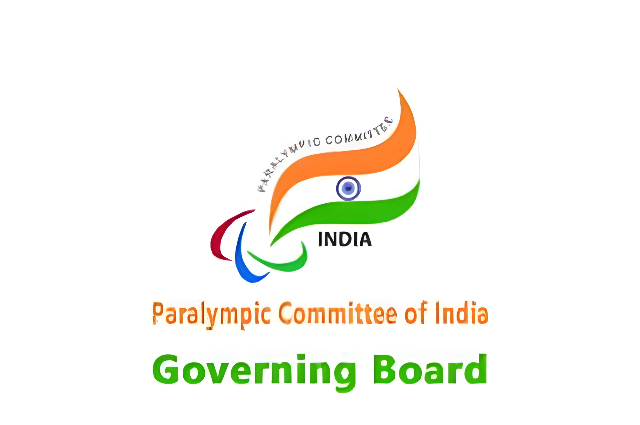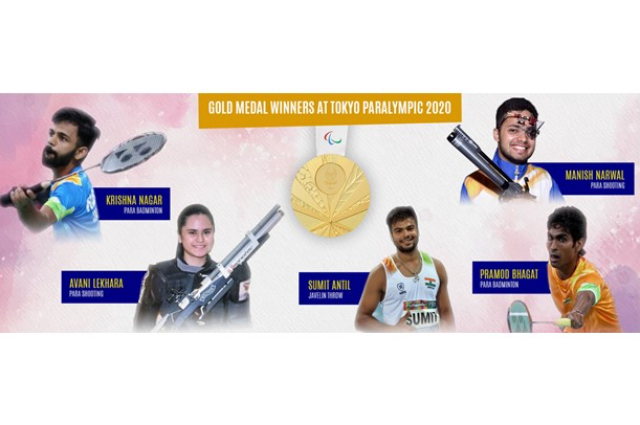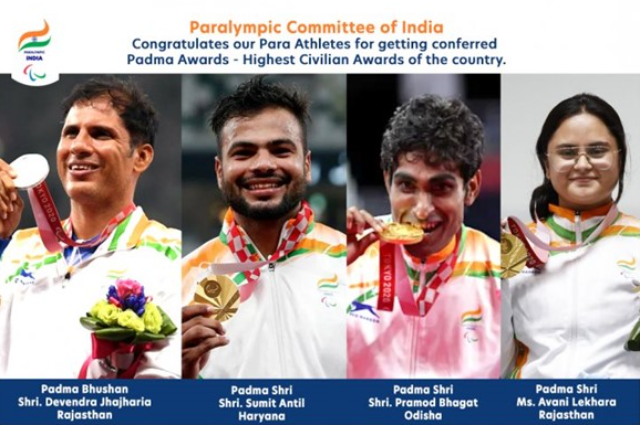Introduction
Paralympic Sports has given the opportunity for many participants to prove themself despite their physical disabilities and earn status and appreciation in the federation. It has been seen multiple times that people often remember sports players but very few knew about Paralympic athletes, what is the reason behind this? What makes the Paralympic Games special? And why is it that very few people take initiative to support these players and why these players should have more support than other players?
The Olympics and Paralympics are two of the world's largest sporting events, held every four years in two parts: the Summer Games and the Winter Games. The Paralympics are held immediately following the Olympics in the same host city. The Olympic Games are older and more well-known than the Paralympics. The primary distinction between the Olympics and the Paralympics is that, whereas the majority of participants in the Olympics are able-bodied, the participants in the Paralympics have some type of physical or intellectual disability.
In this Blog, we will be covering up struggle stories of Paralympic Sports players and also various discussion revolving around the Paralympic sports, the struggles they faced in their game and how were they able to overcome their weaknesses and turned them into a strength to make world realize that disability doesn't allow one to give up instead develop a bounce-back action to ready to face all obstacles that comes in the journey of training for Paralympic Games. Also lastly, there will be various discussions revolving around the Paralympic sports.
India made its first appearance at the Summer Paralympics in Israel in 1968. It participated once more in the 1972 games in West Germany. But it did not participate in the 1976 & 1980 editions of the Summer Games. Since then, the country has taken part in every Summer Paralympics. Here are examples of some of India's leading para-athletes who had competed in Paralympic games.
Devendra Jhajharia
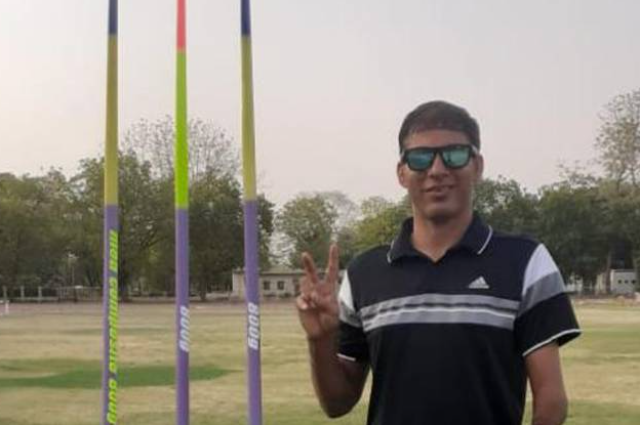
Source: paralympicindia.org
- The event that altered his lifestyle:
He was not born with impairment. He was, in fact, a loud and boisterous child who was always up to mischief in his village of Churu, Rajasthan. But, at the age of eight, he was going to climb a tree when he accidentally touched a 11000-volt live cable that was entangled in a branch. In Fact in one of his interviews with ESPN he said that, "At first, the villagers thought I was dead when they helped me off the tree". Immediately after the incident, doctors were compelled to surgically remove his left arm, and his life was forever changed.
- Reason for taking up Javelin throw as a sports career:
It didn't take long for Jhajharia to realise that his life would never be the same again after the unfortunate incident. When he got home from the hospital, he couldn't socialise or play with his friends like he used to before the incident that occurred. However, the situation had no effect on his self-esteem. In fact, it strengthened him. In an interview with ESPN, he said that other kids considered him a liability and that's why he decided to play a sport and be better at it than them. He then began competing in javelin throw in school and regularly defeated his opposing players. Later, at a para-athletics competition in 1997, coach Ripudaman Singh recognised his athletic ability and encouraged him to pursue the sport seriously.
- Long wait for various achievements unlocked and 2004 success at Athens:
He began competing in international tournaments in the early 2000s, and competed for the 2004 Paralympics in Athens at the age of 23. He went on to win gold in the F46 javelin throw with a world record throw of 62.15m, breaking the previous record of 59.77m. His wait to create a legacy at the Paralympics once more, on the other hand, was long. His event category - F46, for athletes with unilateral limb impairment affecting the shoulder and/or elbow joint of one arm - was not included in the Paralympic programmes in Beijing in 2008 or London in 2012. He had to wait 12 years until the Rio 2016 Paralympics to compete for another Paralympic gold medal.
Sumit Antil
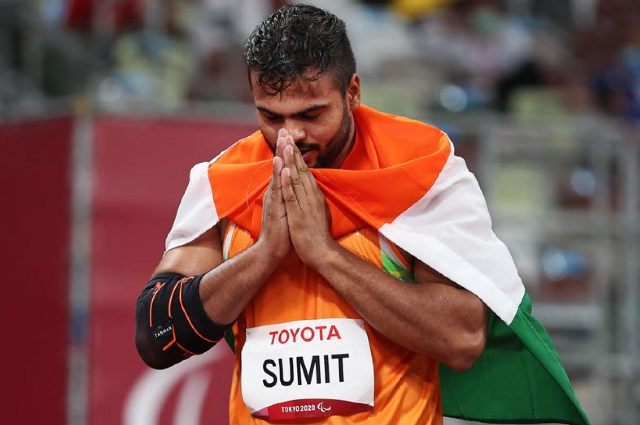
Source: paralympicindia.org
- Background:
Antil is from Sonipat, Haryana, and was born on June 7, 1988. He is from a middle-class family, and his father served in the Indian Air Force as a JWO (Junior Warrant Officer). He had a passion for sports since he was a child, and his main passion was wrestling. He aspired to be a wrestler and idolises Yogeshwar Dutt, a bronze medalist at the London 2012 Olympics.
- The incident that transitioned his life:
He was in an accident on his way back from tutoring while riding a bike on January 5, 2015. He was rushed to the Air Force Hospital, where physicians were forced to amputate his leg below the knee due to the absence of other treatments. He was transferred to the Artificial Limb Center in Pune after 53 days and received a prosthetic leg that enabled him to get up on his feet. His hopes of becoming a wrestler, unfortunately, were cut short. In one of his interviews with Times of India, he stated, "A tractor hit me from behind. I slipped on the road and then the tractor driver failed to apply the brakes on time and ran over my left leg."
- Beginning of Sumit Antil's journey to Parasports:
He refused to give up sports, even after the unfortunate incident. In July 2017, he was notified about the Paralympics by a fellow para-athlete from the same village, Rajkumar. It was a painful and struggle journey, as his prosthetic liner would occasionally fill with blood due to excessive corrosion and heat. He met Virender Dhankar, the silver medalist from the 2018 Asian Games, and was then introduced to javelin mentor Naval Singh, who took Antil under his guidance to be trained. He began training at the Jawaharlal Nehru Stadium in New Delhi.
Antil qualified for the Tokyo 2020 Paralympics in the F64 bracket after winning silver at the 2019 World Para Athletics Championships. Without a doubt, his most notable accomplishment is the gold medal he received at the Tokyo 2020 Paralympics. He is the present international champion and F64 world record holder. In 2019, he managed to win a silver medal at the Paris Open Hand sport. The javelin thrower also finished second at the 2019 World Para Athletics Grand Prix in Italy.
Avani Lekhara
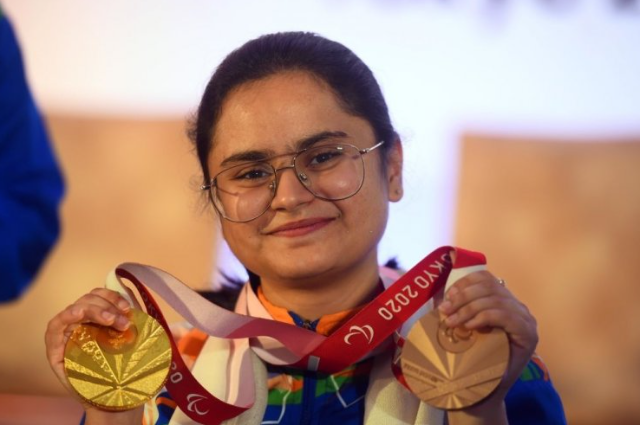
Source: paralympicindia.org
- The tragedy that left injuries: never forgotten:
It was the National Highway connecting Jaipur and Dholpur. A car carrying a family of four skidded and overturned. Praveen Lekhara, his wife Shweta, and their two children, Arnav and Avani, had a close shave. Their world was shaken, regrettably, when the severity of Avani's injuries became known. Avani's spinal cord was damaged, causing her to lose mobility and sensation from the waist down. Avani’s mother while telling Times of India told that, "She turned into an introvert." A young girl, only 11 years old, driven herself into the dark corners of the house.
- Achievements unlocked and no looking back:
In 2015, at the insistence of her father, she began shooting at a shooting range in Jaipur. She was upset about her situation and didn't want to talk to anyone. Her father puts it that she used to take her to the JDA shooting range in Jagatpura, Jaipur, for a change of her mood where she developed an interest in shooting. The youngster was also motivated by Olympic gold-medallist rifle shooter Abhinav Bindra. After carefully reading his autobiography, which was a great gift from her father.
She won India's first-ever Paralympic shooting medal, launching a legendary campaign in Tokyo 2020. After becoming a celebrity in her home country, the athlete stated that her accomplishments were not only for her but for all those "who dare to dream." Lekhara played such an essential position in India's greatest Paralympic Games initiative that she was selected as the flag-bearer at the Closing Ceremony in Japan.
Victory at Paralympics doesn't mean that Sports condition in India has no challenges: more needs to be done
If India's victory at the Paralympics is measured by its steadily increasing medal count, we are undeniably a rising force in the Global South. However, when we look at India as a whole, we face treacherous obstacles to overcome. Renowned media organisations and establishments that are floundering to use portrayals of players with disabilities to progress their business objectives continue to ignore crucial elements of the sport.
It is common knowledge that non-profit foundations promote sports content and that social media managers handle celebrity athletes' accounts. Devendra Jhajharia has remained dedicated to his goal of breaking his own record for as long as he can remember. For more than a decade, as he worked toward that goal, his voice went practically unheard, and even though his unparalleled greatness as an athlete and the skill to be erudite in Hindi, he did not enjoy the same support networks as Deepa Malik, another Paralympian who is applauded for being an intelligent and thoughtful English speaker.
For a variety of justifications, India's Paralympic movement is a failure. Its failure is a well-known truth to the general public that the media ignores. Athletes with disabilities commuting out of the country for international competitions were not well known or written about until December 2016, when India managed to pass a revised disability rights law, right after its effective availability at the Rio Paralympic Games. Leaders and lawmakers saw no political value in paying consideration on to the disabled athlete outside of the families and local groups that proceeded to fundraise and praise for one of their own.
An unexpected entry of sponsorship deals and government funding:
Considering the absence of a research environment to steer Indian sports, Prime Minister Modi's governance has given sports a lot more attention. The mere thought of sports and fitness as important aspects of daily life in usual 'Mann Ki Baat' speeches given to the country has had an effect on ordinary Indians. In many rural areas of India, where young citizens could see no hope for better workforce or training opportunities, these broadcast addresses, which include sports, have given youth hope that they can join government sporting events accommodation and continue pursuing athletic career opportunities within their localities.
The hype of corporate social responsibility financing into some of these identity politics areas to motivate disabled people and sports through non-profit sports publicity organisations has resulted in an increase in attacks of para-athlete abusiveness in India. While sport endorsing organisations and corporations that maintain para-athletes claim otherwise, it has been found a trend of ‘selective implementation' among the practises that these organisations follow.
Why should the Paralympics be given special attention?
Para athletes must be more extensively acknowledged and praised, but they must also be given equivalent potential. They are experts in their disciplines and have overcome their difficulties. Our para athletes show great bravery and perseverance in overcoming intellectual and bodily challenges. They demonstrate tremendous self-discipline and valour in overcoming mental and physical challenges. Their characters are amazing and inspiring because they demonstrate on the field that nothing is absolutely impossible in this world. The Paralympics raise knowledge about various disabilities in the hopes of improving the lives of those with disabilities.
Conclusion
In the end, I would like to conclude by referring to a quote which says,
“Nothing is impossible. The word itself says “I’m possible!”.
If one thinks that their life is difficult then refer to stories of Paralympic sports players. Their stories will inspire everyone to set an example for developing a
“Never giving up attitude”. The success of the Games in Beijing in 2008 and Vancouver in 2010, as well as the plans for London 2012, demonstrate the evolution of the Paralympics over the last half-century. Nonetheless, there are significant qualitative differences. As the Games moved relatively close to the centre of the Olympic moves, they made certain that the disabled society was accepted, both physically and spiritually. As a result, focusing on problems of access and discriminatory practises in relation to an Olympic host town at one moment in time has a demonstration effect that may be beneficial. At all other times, it may have impacts for that city and the larger society.
. . .
References:
- olympics.com
- wecapable.com/indian-athletes-paralympics
- olympics.com/who-is-devendra-jhajharia
- olympics.com//who-is-sumit-antil
- www.google.com/tokyo-paralympics
- theprint.in/opinion
- thebridge.in/tokyo-2020-paralympics
- m.timesofindia.com/sports/tokyo-paralympics
- thebridge.in/amp/tokyo-2020-paralympics
- quotestats.com/topic
- www.quotespedia.org
- www.researchgate.net

